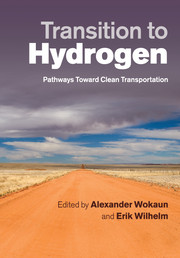Book contents
- Frontmatter
- Contents
- Contributors
- Foreword: on the transition to hydrogen
- Preface
- Executive summary
- Abbreviations
- 1 Introduction
- 2 Life cycle assessment of hydrogen production
- 3 Technical characterisation and multi-criteria analysis of light-duty vehicles
- 4 Hydrogen emissions to the atmosphere from industry and transportation
- 5 Regional fleet simulation
- 6 Long-term scenarios of the global energy and transport system
- 7 Integrated assessment of hydrogen in transportation
- Appendix A Summary of fundamental assumptions
- Appendix B Selected input assumptions, technology descriptions, and heuristics
- Appendix C Characteristics of the present and future vehicle designs
- Appendix D Survey questionnaire and aggregated responses
- Appendix E Assumptions and inputs driving fleet dynamics simulation
- References
- Index
- Plates
Preface
Published online by Cambridge University Press: 05 November 2011
- Frontmatter
- Contents
- Contributors
- Foreword: on the transition to hydrogen
- Preface
- Executive summary
- Abbreviations
- 1 Introduction
- 2 Life cycle assessment of hydrogen production
- 3 Technical characterisation and multi-criteria analysis of light-duty vehicles
- 4 Hydrogen emissions to the atmosphere from industry and transportation
- 5 Regional fleet simulation
- 6 Long-term scenarios of the global energy and transport system
- 7 Integrated assessment of hydrogen in transportation
- Appendix A Summary of fundamental assumptions
- Appendix B Selected input assumptions, technology descriptions, and heuristics
- Appendix C Characteristics of the present and future vehicle designs
- Appendix D Survey questionnaire and aggregated responses
- Appendix E Assumptions and inputs driving fleet dynamics simulation
- References
- Index
- Plates
Summary
Preface
When the project that forms the basis for this book was initiated in 2006, hydrogen was enjoying immense popularity as a possible alternative to fossil fuels as an energy storage vector. Record-breaking attendance at fuel cell exhibitions was common, and the news media was full of the ambitious market introduction plans of fuel cell company representatives and the grand hopes of politicians. It is now 2011, and the euphoria surrounding hydrogen has shifted to batteries and all-electric vehicles; the ‘electron economy’ is being advertised in much the same way. Hype surrounding transportation technology is a common phenomenon, and history provides us with many examples of announcements of ‘major breakthroughs’. Some, like fuel injection, caught on; others, like the ‘Nucleon’ nuclear powertrain, did not. Whether hype hampers or helps society to find and to implement the best solutions for our pressing social and environmental problems is debatable. What is certain is that a thorough analysis of technological alternatives, and perseverance in execution once the best solution (or set of solutions) has been identified, should never be superseded by action plans driven by media attention.
The Alliance for Global Sustainability is the framework that facilitated collaboration between John Heywood’s group at the Massachusetts Institute of Technology and Alexander Wokaun’s team at the Paul Scherrer Institute in investigating vehicle technology alternatives ‘Before the Transition to Hydrogen’. With generous financial support from the Swiss Competence Center for Energy and Mobility (CCEM), these two working groups met biannually with sponsors and partners from industry and professional associations, to share ideas and to engage in exciting multidisciplinary research. The results of the Swiss team’s research are contained in this book. Even though, occasionally, the opinions of the partners from opposite sides of the Atlantic regarding the potential of the various transportation energy technologies investigated did not converge, the collaboration was highly successful because of the high value that both research teams placed on objective and unbiased analysis. In particular, the MIT group’s strength in combustion engine technology and policy research proved to be highly complementary to the PSI group’s technical know-how regarding fuel cells, global energy system modelling, and scenario analysis.
- Type
- Chapter
- Information
- Transition to HydrogenPathways Toward Clean Transportation, pp. xiii - xivPublisher: Cambridge University PressPrint publication year: 2011



